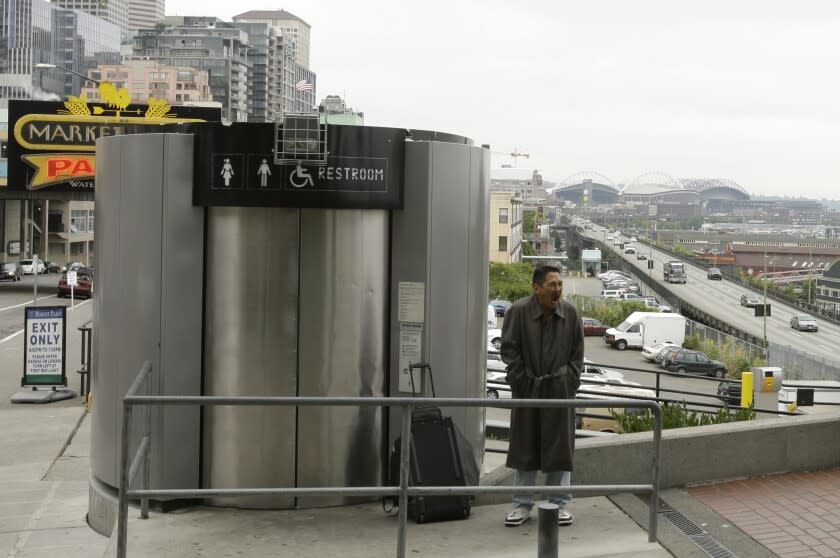Op-Ed: Public bathrooms are a basic human right, but many cities aren't even trying to meet the need

Starbucks Chief Executive Howard Schultz recently announced that his company may soon limit access to its store restrooms — at more than 15,000 locations in the U.S. — to customers only. This would be a loss of critical infrastructure for the broader public in a country already facing a severe shortage of public restrooms.
It's an ongoing sanitation crisis, and it highlights American inequality and marginalization. For decades, public restrooms have been a political flashpoint, intertwined with debates on women’s rights and transgender rights, the legacy of Jim Crow segregation, the opioid crisis and policies on homelessness.
Because political leaders have been hesitant to take action, the private sector has frequently stepped in to fill the gap — notably Starbucks, which in 2018 announced that its stores’ bathrooms would be open to the public, with no purchase required.
However, like food, water and shelter, access to safe sanitation is a fundamental human right. While private companies can certainly choose to provide public access to restrooms, it is the government’s responsibility to ensure sanitation for all. And it’s time we held our political leaders accountable.
Nearly a decade ago, I was sent by the United Nations to assess water and sanitation services in the U.S. Despite being one of the wealthiest countries in the world, the U.S., I found, had woefully inadequate availability of public restrooms — only eight per 100,000 people on average, the same number as Botswana. In comparison, Iceland leads the world with 56 toilets per 100,000 people.
To be clear, this is not just a problem in America, but also in the UK, Belgium and many other countries across the globe.
Where facilities do exist, they are often dirty and hard to find and have limited opening hours. Many also lack proper privacy and safety considerations for women and disabled individuals.
Instead of investing in improved infrastructure, some political leaders have enacted ineffective and punitive policies on sanitation, which have had devastating consequences for the most vulnerable.
This is visible in urban spaces, like parks and squares, which are meant to be centers for accessibility and inclusion. Instead, the removal of water fountains and public restrooms, along with other hostile architecture features such as metal bars on benches, ensure that marginalized communities — like the homeless — are blocked from full participation in public life.
To make matters worse, penalties for public urination and defecation — including heavy fines and in some cases, registration as a sex offender — criminalize individuals with no alternative.
Between 2016 and 2021, Chicago police officers issued at least 29,000 tickets for public urination or defecation — the majority in Black or Latino neighborhoods with high arrest rates.
The pandemic has only exacerbated this issue, as many of the remaining public restrooms were shuttered across the country. This may have been intended to slow the spread of COVID-19, but it triggered other infectious disease outbreaks in homeless camps, including hepatitis A and shigella, which are spread by fecal matter.
Government leaders point to high costs for installing public toilets, but poor sanitation policies often end up costing much more. Last year, San Diego spent millions to clean fecal matter from sidewalks and treat disease outbreaks. Imagine if this money were spent on public restrooms to prevent such problems.
This will happen only if enough people hold political leaders accountable for upholding the human right to sanitation. That starts by prioritizing public restrooms in city budgets. It should be an easy sell: Every dollar spent on urban sanitation brings a return of $2.50 to the economy through reduction in medical costs and increased productivity, according to the World Bank.
And while this basic service is a responsibility of government, there are plenty of models that encourage private-sector partnerships as well. Take San Francisco, which has joined forces with media company JCDecaux to fund the installation and maintenance of public toilets in exchange for allowing advertising kiosks on city sidewalks.
Or Mumbai, where the municipal government has teamed with HSBC India and Hindustan Unilever Utd. on a community sanitation and hygiene project that provides hundreds of public toilets for 2 million people in India’s slums.
We must also consider new technologies, like the self-cleaning toilets that have been installed in Paris and elsewhere. These can help lower maintenance and operation costs. Another innovation: phone apps that help easily locate public restrooms, often with information about physical accessibility features and infant changing spaces.
Above all, governments must ensure that restrooms are affordable, private, open 24/7, physically accessible, and suitable for everyone. This includes proper safety features like lighting and locks to protect women and transgender individuals from sexual violence. It also means waste receptacles for the disposal of period products, as well as soap and water — not just disinfectant — to wash after taking care of menstrual cycles or messy diaper changes.
Ensuring the right to sanitation for all requires a conscious policy shift. Done thoughtfully, this can promote human rights, guarantee affordability, and support public health systems and community development. Or, with continued neglect, the issue will further aggravate inequality and marginalization.
Either way, one thing is clear: It’s so much more than “just a bathroom.”
Catarina de Albuquerque is chief executive officer of the United Nations Sanitation and Water for All global partnership.
This story originally appeared in Los Angeles Times.

 generic
generic 